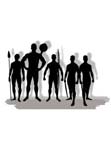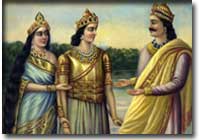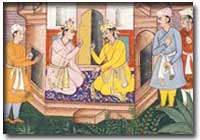THE PANDAVAS AND KAURAVAS
 |

Pandu was perturbed mentally as he must deny himself the pleasures of conjugal bed on the pain of death. He retreated to the forest with his two wives on the ostensible pretext of overbearing love for hunting entrusting the government of the kingdom to Bhishma and Vidura. It was more a less a de- facto abdication and Pandu was not bothered about it as he had no children at that time. In the forest Pandu was leading a life of asceticism along with his two wives. It was an incongruous situation. Pandu, quite hale and healthy, having two devoted accomplished young wives, was compelled to kill his legitimate desires owing to a tragic conspiracy of circumstances. One day Pandu exclaimed to Kunti, "How I wish you beget children; I feel criminally guilty whenever I see you. I have denied you the privilege of womanhood."
Kunti confided to the tormented king that she was blessed with the boon to invoke any God of her choice, by the grace of Durvasa. Pandu insisted that Kunti should use the divine spell to beget children. Kunti with the avowed intention of her pleasing husband invoked the God of righteousness, Yama and Yudhisthira was thus born. Pandu overjoyed at the birth of a son, encouraged his wife to try again. This time she invoked the God of wind and Bhima of superlative strength was born. The baby was so strong that the stone on which he was inadvertently dropped by the mother broke into pieces. Pandu, immensely pleased, asked Kunti to try the spell again. Kunti invoked Indra, the Lord of heaven, and Arjuna was born embodying in himself the prowess of immortal heroism. Pandu was then the proud father of three extraordinary children.

After the exit of Pandu, Dhritarashtra became the titular monarch of the Kuru kingdom assisted by Vidura. When Gandhari was in the family way, news from the forest reached Hastinapura that Kunti gave birth to a child named Yudhisthira. Gandhari gave birth to hundred sons and they were named Duryodhana, Duhsasana, etc. and a daughter. Pandu was leading a happy and a contented life in the forest with his two wives enjoying the company of his children, the five Pandavas.
He almost forgot the wretched curse. Moreover he was long rid of the botherations of kingship and he recouped his health and mental strength in the midst of sylvan serenity. He could enjoy the pristine pleasures provided by nature in different seasons, unadulterated by urban devastation. With the advent of the spring, sometime after the birth of Nakula and Sahadeva, Pandu was transported to exceptional heights of elevation and exhilaration. As Madri appeared before him and adorned with vernal bloom of floral splendor, Pandu quite unmindful of the apparently archaic curse invited his wife to the conjugal bed in spite of her protestations and lost his life. Madri feeling guilty, preferred to immolate herself on the funeral pyre of her husband leaving her two sons to the motherly care of Kunti, known for her sense of responsibility and righteousness.
The hermits of the ashram who were friends of Pandu looked after the education and upbringing of the Pandavas for some years in the absence of their father. Eventually Kunti decided to go to Hastinapura, the right place for the princes to live. Choosing one auspicious day she came to Hastinapura along with some hermits who were the intimate friends of Pandu and presented the Pandava Princes to Dhritarashtra and Bhishma in the imperial court. The Pandava Princes were received with mixed feelings by the members of the court. Varied comments were heard-" It was long ago Pandu retreated to the forest. When did he beget children? The death of Pandu was a pretty past event-no body mentioned anything about his children then." Kunti herself brought the Princes to the royal court and the hermits attested conclusively that they were the children of Pandu. Nobody could raise any formal objection. Vidura welcomed then with open arms. Dhritarashtra was glad that his brother's children came to Hastinapura together with the dowager queen Kunti. Bhishma was very happy to see the promising Princes with blooming faces and the pater familias or the "Pitamaha", as he was called since then with reverent affection, embraced all of them with instinctive eagerness. Ex-queens Satyavati and Ambalika, though they were extremely sad to learn about the death of Pandu, welcomed Kunti, kissing the Pandavas Princes. The citizens of Hastinapura came in a procession to see the sons of Pandu, the memory of whose exemplary rule noted for his fair play and justice, was still green in their memories.

Bhishma appointed Kripacharaya as a teacher to the Princes, sons of Dhritarashtra and Pandu. The sons of Dhritarashtra were known as Kauravas after the family name for the sake of distinction. The sons of Pandu were known as Pandavas though technically they were also Kauravas as they belonged to the same family. Kripacharya taught the Princes the use of arms, especially the bow and arrow. Yudhisthira was the eldest of them all; and he was known for the sense of equilibrium and fair play. Bhima and Duryodhana were of the same age, born on the same day. Bhima was blessed with a strong physique and nobody could surpass him. Every day the sons of Dhritarashtra sustained bodily injuries as a result of Bhima's perverse jokes, and were humiliated. Duryodhana as the eldest used to challenge Bhima championing the cause of his younger brothers, but he was no match to Bhima. Thus the sons of Dhritarashtra nursed a deep hatred and envy towards Bhima from infancy. As the Princes grew up Arjuna developed the aptitude for the bow. Yudhisthira because of his mellowed personality, exemplary character and conduct, impressed all the people with the potentialities of an ideal king.
Though the Kauravas and the Pandavas grew up together playing and learning together, in mirth and merriment, the division into two camps became evident from their childhood. In the eyes of Duryodhana the Pandavas obviously were intruders and he was not able to understand why his father Dhritarashtra was so indulgent to them. Duryodhana and his brothers were enjoying the affectionate patronage of Bhishma exclusively. The Pitamaha was not only showing equal consideration to the Pandavas but sometimes partial towards them. Gradually Duryodhana developed a grouse against the Pandavas. The overbearing attitude of mighty Bhima was the immediate problem with which the prince Duryodhana was confronted with. The Pandavas discussed the attitude of Duryodhana with Vidura who counseled cautious approach. Yudhisthira warned all his brothers to be silent but was not complacent. Adversity thus cemented the mutual bond of affection amongst the Pandava brothers.

